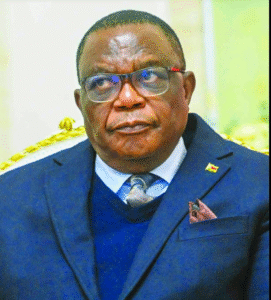MUDENDA DEFIES COURT ORDER IN SHOCKING OF 18 CCC MPS

In an extraordinary act of defiance that has thrown Zimbabwe’s fragile democracy into further disarray, Speaker of Parliament Jacob Mudenda has defied a High Court order and gone ahead with the removal of 18 Members of Parliament and Senators from the main opposition party, the Citizens Coalition for Change (CCC). This dramatic move, taking place amid a bitter and controversial recall saga allegedly orchestrated by state-linked agents, underscores the growing crisis of constitutionalism in the country.
The recall of these MPs, triggered by political activist Sengezo Tshabangu, has been widely condemned as a politically motivated ploy to destabilise the CCC and tilt the balance of power in Parliament in favour of the ruling ZANU PF. Tshabangu, who claims to be the CCC’s interim secretary-general, has no known affiliation with the party under the leadership of Nelson Chamisa. Yet his claims have been astonishingly upheld by Parliament, prompting serious concerns about the politicisation of state institutions and the collapse of legal safeguards designed to protect Zimbabwe’s democratic processes.
Matters came to a head when Justice Tawanda Chitapi issued an interim High Court order instructing Mudenda to halt the recalls pending a scheduled hearing on November 20 at 2:30pm. Mudenda’s legal representatives were present in court and were directed to immediately inform him of the development, given the urgency of the matter. With Parliament due to sit at 2:15pm, and the written court order to follow, Mudenda was informed of the ruling via a phone call from his legal counsel.
Despite this, Mudenda pressed ahead and announced the recalls just after 4pm—well after the oral court order had been issued and communicated. This blatant disregard for judicial authority has stunned legal observers and raised serious questions about the erosion of the separation of powers in Zimbabwe.
According to legal sources, Mudenda’s conduct constitutes a direct violation of a binding judicial directive. “The order was issued orally and conveyed to him before Parliament resumed sitting. His decision to proceed with the recalls is unlawful and shows contempt for the judiciary,” said a lawyer familiar with the case.
The implications of this defiance are far-reaching. It sets a dangerous precedent where powerful officials in Zimbabwe can choose to ignore court rulings when politically convenient. In a democratic system, the independence of the judiciary and the enforcement of its rulings are critical to maintaining the rule of law. When that foundation is undermined, it opens the door to unchecked executive overreach and institutional decay.
The CCC, already battling what it views as systematic political persecution, has called the recalls illegal and has vowed to continue the legal fight. Their challenge against Mudenda is more than a dispute over parliamentary seats—it is a broader defence of democratic integrity in a country where opposition parties have long struggled against repression and manipulation.
Observers note that this episode is part of a wider pattern of democratic backsliding under President Emmerson Mnangagwa’s administration. From the post-election crackdown on dissent to the politicisation of independent commissions, Zimbabwe’s democratic credentials are being eroded with each passing crisis. The removal of elected opposition MPs on the basis of a dubious claim—now reinforced by the Speaker’s disregard for a court order—only adds fuel to growing domestic and international criticism of Zimbabwe’s governance.
The November 20 court hearing now looms large. Not only will it determine the fate of the 18 recalled legislators, but it will also be a litmus test for the judiciary’s independence and resilience. Can Zimbabwe’s courts act as an effective check on political overreach, or will they be sidelined like so many other institutions?
As the world watches, Zimbabwe once again finds itself at a crossroads. Upholding the rule of law is the only path toward restoring faith in its institutions. If the current trajectory continues, the country risks sliding deeper into authoritarianism—where democratic accountability is replaced by impunity and silence.
Mudenda’s defiance is not just a legal matter. It is a political earthquake whose aftershocks will be felt across the entire nation.



